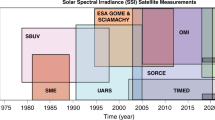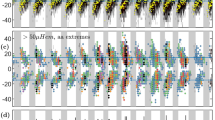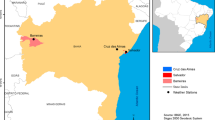Abstract
IN this communication we examine the autocorrelation function R of various indexes of solar activity over time-lags,τ, of 1–200 days. Four indexes of solar activity were used: the daily relative sunspot number (Zurich), and the mean daily fluxes from Nagoya at the frequencies 1,000 Mc/s, 3,750 Mc/s and 9,400 Mc/s. The data were analysed for the years 1957–58 (more than 700 days) and for the years 1960–63 (900 days), thus comparing the highly active years of the solar cycle with the less-active years. In addition, the relative sunspot numbers for the years 1947–48 and 1937–38 were analysed for comparison.
This is a preview of subscription content, access via your institution
Access options
Subscribe to this journal
Receive 51 print issues and online access
$199.00 per year
only $3.90 per issue
Buy this article
- Purchase on Springer Link
- Instant access to full article PDF
Prices may be subject to local taxes which are calculated during checkout
Similar content being viewed by others
References
Das Gupta, M. K., and Basu, D., Nature, 197, 443 (1963).
Author information
Authors and Affiliations
Rights and permissions
About this article
Cite this article
ALTSCHULER, M., SASTRY, C. Autocorrelation of Solar Activity. Nature 206, 1035–1036 (1965). https://doi.org/10.1038/2061035a0
Issue Date:
DOI: https://doi.org/10.1038/2061035a0
This article is cited by
-
Some features of relative sunspot number during the declining phase of solar cycle 19
Solar Physics (1968)
-
A high resolution spectral analysis of daily relative sunspot number and 10·7 cm. Solar flux
Proceedings of the Indian Academy of Sciences - Section A (1968)
Comments
By submitting a comment you agree to abide by our Terms and Community Guidelines. If you find something abusive or that does not comply with our terms or guidelines please flag it as inappropriate.



